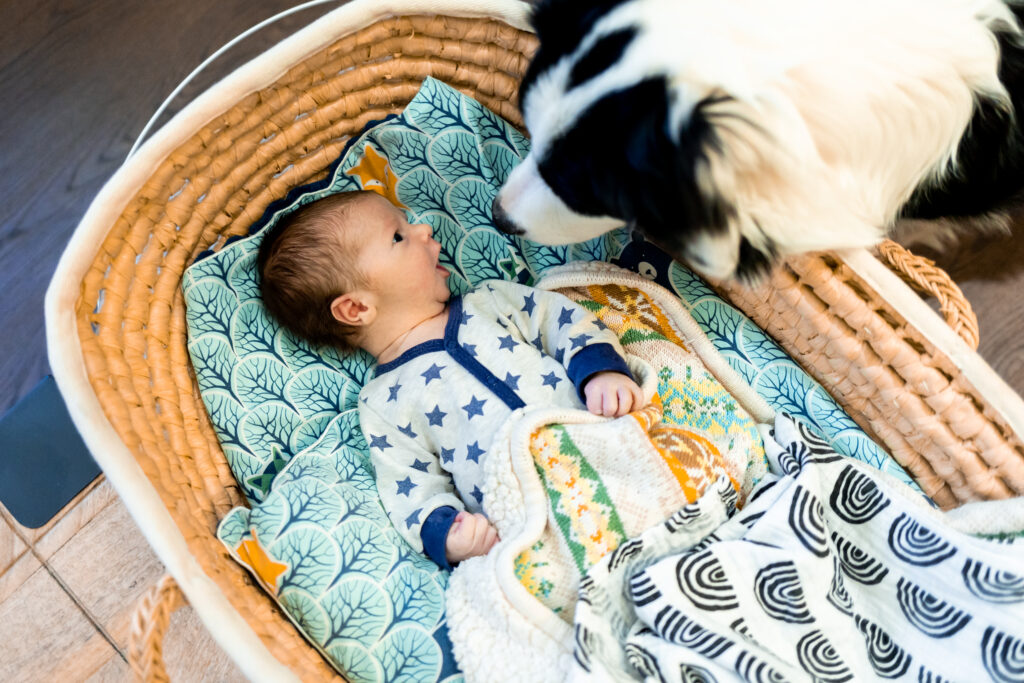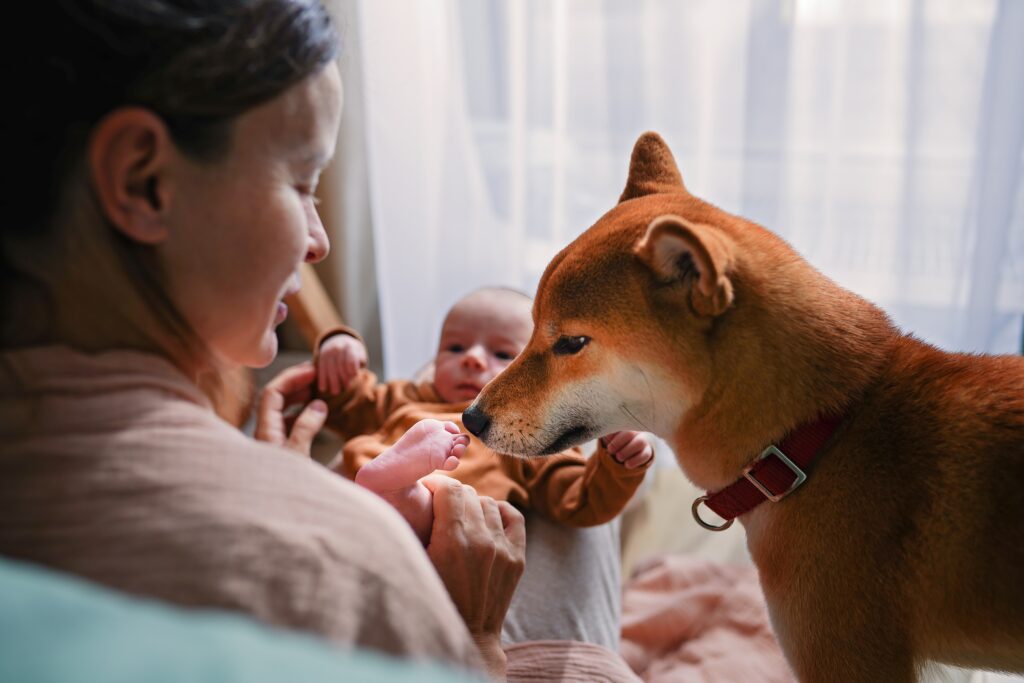Bringing a baby into your home is a life-changing experience—and if you have a dog, it’s a transition for them, too. Balancing dogs and babies under one roof can feel overwhelming, especially when it comes to safety, boundaries, and maintaining harmony. The good news is that with the right preparation, your dog and baby can coexist peacefully and even form a loving bond. Taking time to prepare your pup ahead of your baby’s arrival will make the transition smoother and less stressful for everyone involved.
The following tips can help your dog adjust to this big change and set the foundation for a safe and successful introduction.
Start Preparing Early
You don’t need to wait until you bring your baby home to start preparing your dog. The sooner you begin, the better. Dogs are sensitive to changes in their environment and routine, so gradually introducing new smells, sounds, and baby-related items will help avoid overwhelming them all at once.
If there are areas in your home that will be off-limits to your dog, like the nursery, start enforcing those boundaries now. Let your dog explore baby furniture and gear while it’s still unoccupied so that it becomes a familiar part of their environment, not a source of confusion or stress later on.
Reinforce Basic Obedience Commands
When it comes to managing dogs and babies, reliable obedience is a must. Commands like “sit,” “stay,” “leave it,” “down,” and “go to your bed” are incredibly helpful once your baby arrives. For example, you may need your dog to sit calmly while you’re feeding the baby or stay out of the nursery during nap time.
If your dog’s obedience is rusty or inconsistent, take time to brush up on their training now. Practicing in various parts of the house, with distractions, will prepare your dog to respond reliably when the baby is home and life is more chaotic.
Introduce Baby Sounds and Smells
Babies create a lot of noise that your dog is unfamiliar with. Crying, giggling, toys, swings, and other gear can be unsettling for a dog that’s never experienced them. Start desensitizing your dog by playing recordings of baby noises at low volumes while rewarding calm behavior. Gradually increase the volume over time.
You can also introduce baby scents ahead of time—use lotions, powders, and other products you’ll be using on your baby so your dog starts to think of these scents as normal. When the baby is born, it can be helpful to have a family member bring home a blanket or onesie for your dog to sniff before the first meeting.
Familiarize Your Dog With Baby Gear
From strollers to bouncers and swings, baby gear can be both interesting and intimidating to dogs. Begin introducing these items in small increments. Set up the stroller and practice walking your dog beside it so they get used to the pace and space. Turn on baby swings and noise machines so the sounds won’t be startling.
Helping your dog navigate around these items early on can prevent nervousness or undesirable behaviors once the baby is using them daily.
Establish Boundaries
Decide where your baby will sleep, play, and be fed—and set boundaries for those areas well before your baby arrives. This could mean training your dog not to enter the nursery, not to jump on the couch while you’re holding the baby, or not to nudge your arm during feeding.
Visual cues such as baby gates or play mats can help reinforce boundaries. Keep in mind that consistent practice is necessary. Don’t wait until your baby comes home to start enforcing these new rules.

Make the First Introduction Calm and Controlled
When you finally bring your baby home, your dog will likely be excited, curious, or possibly confused. Keep the initial introduction low-key. Greet your dog first so they don’t associate the baby’s arrival with being ignored. Let your dog sniff the baby’s blanket or clothes before any face-to-face meeting.
When introducing dogs and babies, keep your dog on a leash for control and maintain a calm, positive energy. Watch your dog’s body language and reward calm, relaxed behavior. Keep the interaction short and sweet at first, gradually increasing time as your dog becomes more comfortable.
Maintain Your Dog’s Routine
In the flurry of baby feedings, diaper changes, and sleepless nights, it’s easy to overlook your dog’s needs. However, neglecting their routine can lead to anxiety or attention-seeking behavior. Try to keep your dog’s feeding, walking, and playtimes as consistent as possible.
Even short moments of quality attention—a quick walk or a game of fetch—can go a long way in making your dog feel included and secure in this new chapter of your life.
Supervise All Interactions
Even the most well-behaved dog should never be left unsupervised with a baby. Dogs communicate differently from humans and can become stressed, overstimulated, or confused. Learn to read your dog’s body language—signs of discomfort include yawning, lip licking, turning away, or stiffening.
It’s also important to advocate for your dog. If they need space, give it to them. Not every dog wants to be touched, leaned on, or climbed over, and teaching your child respectful behavior as they grow is just as important as training your dog.
Dogs and Babies – Prepare with the Professionals
Balancing dogs and babies requires planning, patience, and thoughtful preparation. Before your baby arrives, it’s a good idea to make sure your dog’s training is solid and stress levels are under control. At Beau’s K9 Academy, we help dog owners prepare for the transition of bringing home a baby with personalized, family-focused training plans.
Our expert trainers can evaluate your dog’s current obedience, identify any behavioral issues that need addressing, and create a structured program to help your dog adjust with confidence. We specialize in helping families reinforce basic commands, establish household boundaries, and desensitize dogs to the new sights, sounds, and changes that come with welcoming a baby.
Contact us today to schedule a consultation. Preparing your dog now ensures that when your baby arrives, the entire family is ready for the journey ahead.

Dogs and Babies FAQs
When should I start preparing my dog for my baby’s arrival?
Start as early as possible—ideally during pregnancy. Gradual introductions to new routines, sounds, and baby gear will help reduce your dog’s stress and make the transition easier.
What basic obedience commands should my dog know before my baby arrives?
Essential commands include “sit,” “stay,” “leave it,” “down,” and “go to your bed.” These help maintain control and safety around your baby.
How can I help my dog get used to baby noises and smells?
Play recordings of baby sounds at low volume while rewarding calm behavior. Use baby lotions or powders in the home so your dog becomes familiar with new scents.
Can my dog be in the same room as my baby?
Yes, but supervision is key. Use boundaries like baby gates or mats, and never leave your dog and baby alone together, no matter how calm your dog seems.
How should I introduce my dog to my baby for the first time?
Keep the introduction calm and controlled. Let your dog sniff baby-related items first, then allow a brief, leashed interaction while rewarding relaxed behavior.
What if my dog seems anxious or overly excited after the baby comes home?
Stick to a consistent routine and provide mental stimulation. If issues continue, consider professional training to help your dog adjust to your new family member.

